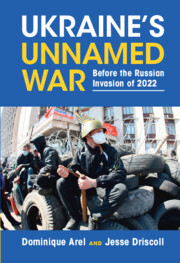Crossref Citations
This Book has been
cited by the following publications. This list is generated based on data provided by Crossref.
Волошина-Сійдей, Вікторія
Євсєєва, Ольга
Маслиган, Олена
Сирцева, Світлана
Нестеренко, Олена
and
Гаркуша, Сергій
2023.
СТРАТЕГІЧНІ ОРІЄНТИРИ РОЗВИТКУ ЕКОНОМІКИ В УМОВАХ ГЛОБАЛЬНИХ ВИКЛИКІВ ТА ВОЄННОЇ АГРЕСІЇ (УКРАЇНСЬКИЙ КЕЙС).
Financial and credit activity problems of theory and practice,
Vol. 1,
Issue. 48,
p.
219.
Ostapenko, Liudmyla
Vorontsova, Anna
Voronenko, Iryna
Makarenko, Inna
and
Kozmenko, Serhiy
2023.
Coverage of the Russian armed aggression against Ukraine in scientific works: Bibliometric analysis.
JOURNAL OF INTERNATIONAL STUDIES,
Vol. 16,
Issue. 3,
p.
9.
Agnew, John
2023.
War, State and Sovereignty.
p.
43.
Polianskii, Mikhail
2024.
Inside Vladimir Putin’s Hall of Mirrors: How the Kremlin’s Miscalculation of Western Resolve Emboldened Russia’s Invasion of Ukraine.
Nationalities Papers,
p.
1.
Kyselova, Tetiana
2024.
Including Civil Society in Peace Negotiations: The War in the Ukraine Donbas Region (2014–21).
Journal of Intervention and Statebuilding,
p.
1.
Cooper, Luke
2024.
The Palgrave Handbook of Contemporary Geopolitics.
p.
439.
Toal, Gerard
2024.
The territorial taboo: Explaining the public aversion to negotiations in the Ukraine war support coalition.
Environment and Planning C: Politics and Space,
Vol. 42,
Issue. 7,
p.
1108.
Chaika, Oksana
2024.
Kyiv or Kiev: how Russian propaganda has been shaping geopolitical narratives.
EUREKA: Social and Humanities,
p.
51.
Korab-Karpowicz, W
2024.
The Unhealed Wound of Radical Ukrainian Nationalism: The Russia-Ukraine War from Poland's Perspective.
SSRN Electronic Journal,
Cooper, Luke
2024.
The Palgrave Handbook of Contemporary Geopolitics.
p.
1.
Besenyő, János
2024.
Terrorism and Political Contention.
p.
107.
Guerra, Nicola
2024.
Foreign fighters from the far right and extreme left in the Russia–Ukraine conflict.
Dynamics of Asymmetric Conflict,
Vol. 17,
Issue. 1,
p.
44.
Kuzio, Taras
2024.
Ukrainian versus Pan‐Russian Identities: The Roots of Russia's Invasion of Ukraine.
Studies in Ethnicity and Nationalism,
Vol. 24,
Issue. 3,
p.
234.
Åtland, Kristian
2024.
War, diplomacy, and more war: why did the Minsk agreements fail?.
International Politics,
Ekman, Per
2024.
Painful Moments and Realignment: Explaining Ukraine’s Foreign Policy, 2014–2022.
Problems of Post-Communism,
Vol. 71,
Issue. 3,
p.
232.
Han, Enze
2024.
Modes of Securitization and Desecuritization of Transnational Kinship Ties: Overseas Chinese in Southeast Asia amidst Rising Chinese Power.
Journal of Global Security Studies,
Vol. 10,
Issue. 1,
Squires, Yulia Ivaniuk
2024.
Prisoners of Impunity: What the Global Community Should Know about and Learn from the Russo-Ukrainian War.
Peace Review,
Vol. 36,
Issue. 1,
p.
83.
Ishchenko, Volodymyr
2024.
Class or regional cleavage? The Russian invasion and Ukraine’s ‘East/West’ divide.
European Societies,
Vol. 26,
Issue. 2,
p.
297.
Fagerholm, Andreas
2024.
Sympathy or Criticism? The European Far Left and Far Right React to Russia’s 2022 Invasion of Ukraine.
Europe-Asia Studies,
Vol. 76,
Issue. 6,
p.
829.
Holesch, Adam
Zagórski, Piotr
and
Ramiro, Luis
2024.
European radical left foreign policy after the invasion of Ukraine: shifts in assertiveness towards Russia.
Political Research Exchange,
Vol. 6,
Issue. 1,



